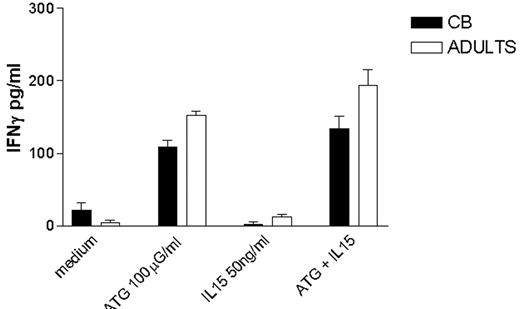Abstract
Rational: The beneficial effect of NK cells after clinical hematopoietic transplantation has been seen when anti-thymocyte globulin (ATG) was used within the conditioning regimen. We therefore investigated the effect of ATG on human NK cells. Materials and methods: Percentages of CD3+ and CD3−/CD56+ among PBMC from either normal adult volunteers or cord blood were assessed by flow cytometry. Negatively purified NK cells were cultured for 2–4 days either alone or in the presence of rabbit ATG (Thymoglobuline, Sangstat) and/or IL-15, and then assessed for cell viability and functional properties: apoptosis were investigated by Annexin V staining. Cell proliferation was assessed by CFSE dye dilution. IFN-gamma secretion was quantified by ELISA. Cytotoxicity against K562 cells was studied by a 51Cr release assay. Binding of monoclonal antibodies to NK cells was assessed alone or after competition with whole ATG or ATG-Fab’2 fragments.
Results: The percentage of CD3+ cells in PBMC was over 65% before or after culture without ATG. In contrast, no T cell was detected after culture with ATG, whereas the percentage of NK cells increased from less than 15% to more than 50%. Both whole ATG and Fab’2 fragments bound NK cells while rabbit Fc fragments did not. ATG did not modify apoptotic and necrotic NK cells percentages. Proliferation was not affected by ATG. IFN-gamma production was dramatically increased by ATG treatment (figure). ATG respected IL15 induced NK cell cytolytic activity. Competition assays showed that ATG did not alter CD2, CD11a, CD16, CD56, CD57, CD62L, CD94, CD158a, CD158b, NKG2a, NKG2d, HLA-DR expression. CD18 and NKp46 expression was slightly decreased.
Conclusion: Our data show that ATG may play a role in the results of KIR mismatch hematopoietic stem cell transplantation. It may be possible that ATG confers functional advantages to NK cells versus T cells.
Author notes
Corresponding author


